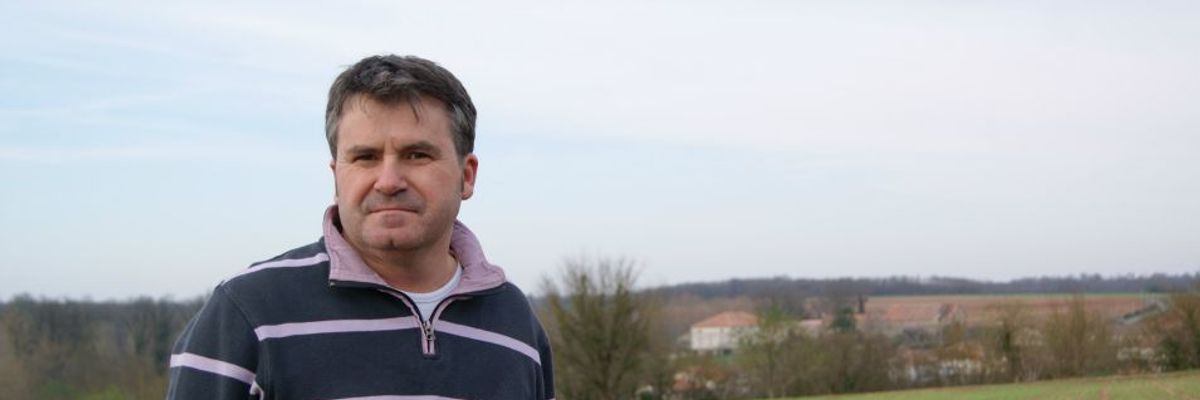
Paul Francois (Photo: phyto-victimes.fr)
To donate by check, phone, or other method, see our More Ways to Give page.

Paul Francois (Photo: phyto-victimes.fr)
A French court on Thursday upheld a prior ruling which found agrichemical giant Monsanto guilty of poisoning a farmer who inhaled the company's Lasso herbicide and ordered the company to fully compensate the man for the neurological problems, headaches, and memory loss he has endured.
The appeals court in Lyon affirmed a previous 2012 court decision--the first of its kind--which found Monsanto "responsible" for poisoning Paul Francois, a grain grower who was exposed to the chemical on his farm in 2004. Francois says the company did not provide adequate warning labels for Lasso.
Francois was reportedly pleased with Thursday's ruling, declaring it to be proof that "David can win against Goliath... And a giant like Monsanto is not above the law."
Monsanto, however, has vowed to appeal the ruling to France's highest appeals court.
Used since the 1960s, Lasso was banned in France in 2007, following earlier prohibitions in Canada, Belgium, and Britain due to the health risks it poses.
Monsanto now widely produces another herbicide, known as Roundup, which contains the ingredient glyphosate that was recently declared by the research arm of the World Health Organization has to be a "probably carcinogen" for humans.
In June, France ceased over-the-counter sales of Roundup over concerns about its health impacts, but Roundup is still one of the most widely-used herbicides in the United States.
Earlier this week, California's Environmental Protection Agency revealed that it will also soon start labeling glyphosate a "probable carcinogenic."
Common Dreams is powered by optimists who believe in the power of informed and engaged citizens to ignite and enact change to make the world a better place. We're hundreds of thousands strong, but every single supporter makes the difference. Your contribution supports this bold media model—free, independent, and dedicated to reporting the facts every day. Stand with us in the fight for economic equality, social justice, human rights, and a more sustainable future. As a people-powered nonprofit news outlet, we cover the issues the corporate media never will. |
A French court on Thursday upheld a prior ruling which found agrichemical giant Monsanto guilty of poisoning a farmer who inhaled the company's Lasso herbicide and ordered the company to fully compensate the man for the neurological problems, headaches, and memory loss he has endured.
The appeals court in Lyon affirmed a previous 2012 court decision--the first of its kind--which found Monsanto "responsible" for poisoning Paul Francois, a grain grower who was exposed to the chemical on his farm in 2004. Francois says the company did not provide adequate warning labels for Lasso.
Francois was reportedly pleased with Thursday's ruling, declaring it to be proof that "David can win against Goliath... And a giant like Monsanto is not above the law."
Monsanto, however, has vowed to appeal the ruling to France's highest appeals court.
Used since the 1960s, Lasso was banned in France in 2007, following earlier prohibitions in Canada, Belgium, and Britain due to the health risks it poses.
Monsanto now widely produces another herbicide, known as Roundup, which contains the ingredient glyphosate that was recently declared by the research arm of the World Health Organization has to be a "probably carcinogen" for humans.
In June, France ceased over-the-counter sales of Roundup over concerns about its health impacts, but Roundup is still one of the most widely-used herbicides in the United States.
Earlier this week, California's Environmental Protection Agency revealed that it will also soon start labeling glyphosate a "probable carcinogenic."
A French court on Thursday upheld a prior ruling which found agrichemical giant Monsanto guilty of poisoning a farmer who inhaled the company's Lasso herbicide and ordered the company to fully compensate the man for the neurological problems, headaches, and memory loss he has endured.
The appeals court in Lyon affirmed a previous 2012 court decision--the first of its kind--which found Monsanto "responsible" for poisoning Paul Francois, a grain grower who was exposed to the chemical on his farm in 2004. Francois says the company did not provide adequate warning labels for Lasso.
Francois was reportedly pleased with Thursday's ruling, declaring it to be proof that "David can win against Goliath... And a giant like Monsanto is not above the law."
Monsanto, however, has vowed to appeal the ruling to France's highest appeals court.
Used since the 1960s, Lasso was banned in France in 2007, following earlier prohibitions in Canada, Belgium, and Britain due to the health risks it poses.
Monsanto now widely produces another herbicide, known as Roundup, which contains the ingredient glyphosate that was recently declared by the research arm of the World Health Organization has to be a "probably carcinogen" for humans.
In June, France ceased over-the-counter sales of Roundup over concerns about its health impacts, but Roundup is still one of the most widely-used herbicides in the United States.
Earlier this week, California's Environmental Protection Agency revealed that it will also soon start labeling glyphosate a "probable carcinogenic."